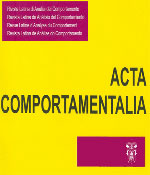Forced “social” responses and preference changes between individual and social contingencies in children and adults
DOI:
https://doi.org/10.32870/ac.v11i2.14618Keywords:
dyads, social contingencies, forced response, altruism, competition.Abstract
We designed four experiements to evaluate whether forced responses in a peer´s task would change individual preferences between individual and social contingencies. Dyads of children and dyads of adults participated in situations of partial altruism, total altruism, and competition. The experimental task consisted in completing puzzles presented on the screens of two synchronized computers. The dyads were exposed to two types of training that alternated (a) conditions with choices between social and individual contingencies and (b) conditions that forced the participants to respond in the peer´s puzzle. In four experiments, half of the dyads solved the task with both subjects in the same room; in the other half of the dyads each participant worked in a separate room. The results suggest that exposure to forced-response conditions produce different efferent, depending on the type of contingency shared during the choice conditions.
Downloads
Downloads
How to Cite
Issue
Section
License

<a rel="license" href="http://creativecommons.org/licenses/by-nc-sa/4.0/"><img alt="Licencia de Creative Commons" style="border-width:0" src="https://i.creativecommons.org/l/by-nc-sa/4.0/88x31.png" /></a><br />Este obra está bajo una <a rel="license" href="http://creativecommons.org/licenses/by-nc-sa/4.0/">licencia de Creative Commons Reconocimiento-NoComercial-CompartirIgual 4.0 Internacional</a>.






